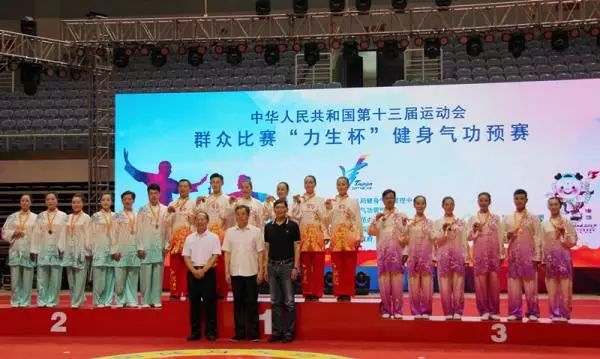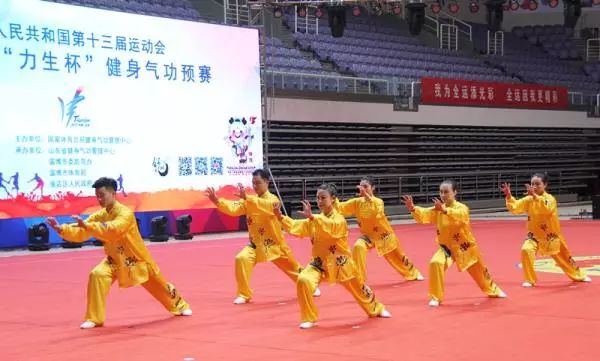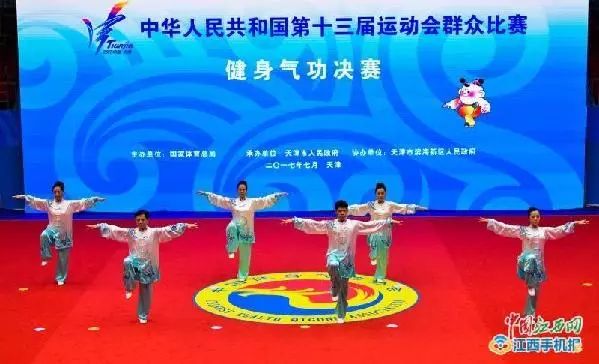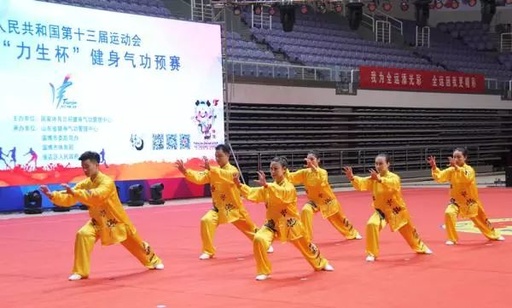
As a part of China’s traditional culture, 健身气功 (jiànshēn qìgōng, fitness qigong) has a history that predates 太极 (tàijí, Tai Chi). However, this is the first time that fitness qigong has been included as a competitive sport in the National Games.
This year’s National Games features a total of 6 gold medals for fitness qigong, including practices such as 易筋经 (yìjīn jīng, Muscle-Tendon Change Classic), 五禽戏 (wǔqín xì, Five Animal Play), 六字诀 (liùzì jué, Six-Character Formula), 八段锦 (bāduàn jǐn, Eight Pieces of Brocade), and 气舞 (qìwǔ, Qigong Dance). The competitors are all skilled practitioners selected from various professions.
Mr. Song, a 55-year-old mathematics teacher, is one of these experts. He told reporters that he has been practicing fitness qigong for over 8 years and firmly believes in its health benefits.
“If it weren’t beneficial, I wouldn’t have been able to stick with it for so many years,” Mr. Song confidently stated. “It helps with the stretching of ligaments and the flexibility of joints, and its movements are symmetrical, allowing every joint in the body to be engaged.”

Preliminary competition for fitness qigong at the National Games.
Who says math teachers are not good at sports?
This year, fitness qigong was included for the first time in the public competition at the Tianjin National Games. According to the organizing committee, there are 6 gold medals available, with a total of 16 teams and 96 athletes participating.
Most of these competitors were selected from fitness qigong stations across various provinces and cities, and they come from diverse professional backgrounds. Among the participants representing the Shanghai team in the group competition of 五禽戏 (wǔqín xì, Five Animal Play) is Mr. Song, who teaches mathematics at a middle school in Songjiang District.
“I initially practiced Tai Chi at the station, and later when they promoted fitness qigong, I followed along. They thought I performed well enough to compete,” Mr. Song recalled while holding his performance costume after just finishing a demonstration.
Mr. Song mentioned that due to his busy work schedule, he usually practices fitness qigong on weekends. “On weekend mornings, I generally practice for about two hours, and if I have time during the weekdays, I occasionally find a place to practice one or two forms.”
However, to prepare for the Tianjin National Games, Mr. Song had to take leave from school. “At first, I only practiced on weekends, sometimes taking half a day off to practice with everyone, but after the closed training, I had to ask for a long leave and have someone else cover my classes.”
In the competition on the afternoon of July 9, the Shanghai team performed fifth, and the five members completed a set of 五禽戏 (wǔqín xì, Five Animal Play) to the accompaniment of traditional folk music, receiving a score of 9, which placed them seventh among all participating teams.
There was also a touching moment during the competition when a female team member from the Shanghai team insisted on completing the performance despite suffering from a back injury. After the performance, she held her waist with a pained expression. “That was an old injury; it might have flared up due to the increased training volume,” Mr. Song explained.
“I think they performed excellently!” After the competition, team leader Fan Benhao expressed to reporters, “Our team members worked very hard, truly embodying the spirit of national fitness and health.”

“Fitness Qigong Cured My Modern Illnesses”
Mr. Song, now 55, admits that as he ages, his body is gradually deteriorating. “Especially my balance, joints, and ligaments are degrading, so I feel less agile when performing movements than before.”
“I used to love sports, playing basketball, volleyball, and soccer, but I felt less nimble over time, so I started practicing Tai Chi and fitness qigong.”
“Fitness qigong is very helpful for stretching ligaments and improving joint flexibility, and its movements are symmetrical, allowing every joint in the body to be engaged,” Mr. Song analyzed.
Through personal experience, Mr. Song has also found that fitness qigong greatly alleviates modern ailments. “It is very effective for spinal health; issues with the neck, shoulders, and lumbar spine are modern diseases, and fitness qigong has a good relieving effect on these.”
“Sitting in the office for long periods, reading, and grading papers can be very uncomfortable. I practice a movement, and my body relaxes immediately,” Mr. Song demonstrated, standing straight.
Now, more and more friends around him are practicing fitness qigong, which Mr. Song sees as a positive development. “Any sport that lacks public participation will not last long.”
According to Chang Jianping, director of the National Fitness Qigong Center, the number of people practicing fitness qigong in China has increased from over 1 million to 4.5 million. In the three years since the establishment of the International Qigong Federation, the number of member associations has grown from 54 to 87.
Team leader Fan believes that fitness qigong is particularly suitable for popularization among the public. “It requires little space and has excellent fitness effects, making it a very worthwhile public fitness activity.”
“We treat weekend fitness as a party, where everyone meets and chats while also exercising, which is a great balance,” Mr. Song said.

The Jiangxi team in the fitness qigong Five Animal Play group competition.
Eliminating Misunderstandings: Its Purpose is Fitness
In an interview, Chang Jianping stated that as a part of traditional Chinese culture, qigong is neither a religious superstition nor a mysterious art, but a means of pursuing physical and mental harmony through fitness.
Mr. Song believes that there are some misunderstandings about qigong among the public. “This is mainly due to the proliferation of misleading practices in recent years, which have made it seem esoteric and difficult to explain scientifically, leading to confusion and misunderstandings.”
To better inherit and develop traditional Chinese culture, the China Fitness Qigong Association has created new forms of fitness qigong based on traditional practices, including 易筋经 (yìjīn jīng, Muscle-Tendon Change Classic), 五禽戏 (wǔqín xì, Five Animal Play), 六字诀 (liùzì jué, Six-Character Formula), 八段锦 (bāduàn jǐn, Eight Pieces of Brocade), 太极养生杖 (tàijí yǎngshēng zhàng, Tai Chi Health Stick), 导引养生功十二法 (dǎoyǐn yǎngshēng gōng shí’èr fǎ, Twelve Methods of Health Cultivation), 十二段金 (shí’èr duàn jīn, Twelve Segment Golden), 马王堆导引术 (mǎwángduī dǎoyǐn shù, Mawangdui Health Cultivation), and 大舞 (dàwǔ, Grand Dance).
“This sport has a very positive effect on public health, and it aligns with TCM principles, organically combining the essence of Confucianism, Taoism, and Buddhism with physical exercise,” team leader Fan expressed to reporters.
“The history of qigong is even longer than that of Tai Chi; however, it has undergone transformations and has blended with movements from Tai Chi and other martial arts, and it is possible that Tai Chi itself borrowed some movements from fitness qigong.”
“Tai Chi is ultimately a martial art, primarily focused on combat, while fitness qigong is different; it emphasizes the twisting of joints and stretching of ligaments.”
“Its purpose is fitness, so the fitness effects of Tai Chi may not be as effective as those of fitness qigong.”
Is Fitness Qigong Suitable for Competition?
Although including fitness qigong in the public events of this year’s National Games is an innovation and attempt, team leader Fan believes that whether the competition format can objectively and fairly reflect the abilities of the competitors is still debatable.
“For public demonstration events, we believe that the competition mechanism may not be the best approach. In some respects, showcasing individual styles through a platform and purely scoring is difficult to reflect objectively.”
“Each judge’s understanding of this event is the same, and each competitor’s height, arm length, breathing, and body shape are different, so it is very forced to require a specific angle and posture.”
Team leader Fan believes that public competitions may be better suited to demonstration and display formats, and that ranking in some competitive public events may not be beneficial. “Our ultimate goal is still to promote public health and get the general public moving.”
Regarding how to conduct competitions in public sports, Fan also provided his suggestions. “Actually, we could use a standard system to allow the public to reach a certain level; this mechanism may be more conducive to the promotion and development of public sports and events.”
Everyone is watching
Most of the country will experience a “baking” test! After seeing the “furnace” rankings, various places expressed dissatisfaction!
Good news! The handling fee for personal cash withdrawals at different locations will be canceled in August, and six other fees will be suspended.
Just because of a 1 yuan price difference, a noodle shop owner was attacked by a diner, and the suspect’s mental evaluation has been released.
Source: The Paper
Reporter: Li Qiong
Editor: Gu Peng

